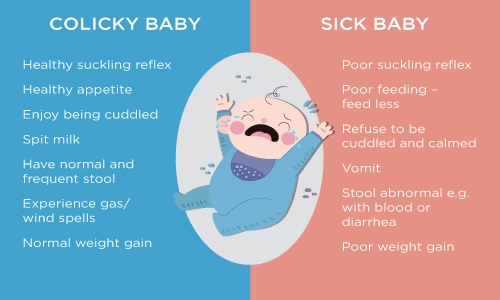
Every prospective mother has two major fears: the challenge of giving birth and the fear of having a colicky baby. Babies are gifts – this should be the attitude with which all parents should guard themselves, as they expect their newborn babies to join them. This article will help new mums identify what are the signs of colic and the effective ways to handling a colicky baby.
What is Colic?
Colic is neither a disease nor a sign of a disorder in your baby. In fact, colicky babies are usually very healthy babies. A baby is colicky, when he cries for hours on end, without reason. Babies who are born premature, or those who have undergone a difficult birth, are prone to colic behaviours. Other children are just colicky due to their temperaments – they are exceptionally sensitive and react with crying uncontrollably to any unfamiliar stimuli.
Although most doctors cannot really tell you the cause of colic in babies, some say that immature babies who have an underdeveloped nervous system are less tolerant to external stimulation, or those who are allergic to milk become colic, although this is just a theory.
What are the Differences between Colicky & Sick Babies?

____________________
Read Related Articles:
Newborn Sleep Facts Every New Parent Should Know
12 Ways to Soothe a Fussy Newborn
Basic Things to Buy for Your Newborn Baby
____________________
Handling Colicky Baby & Prevention of Colic Tendencies
In order to be able to deal with a colicky baby, you need to seek the guidance of your baby’s pediatrician. However, there are some suggestions that would go a long way to help you manage or even prevent colic reaction in your child. Here are some tips to calm your baby:
- Swaddle your baby – this provides a sense of protection thus a calming effect.
- Give your baby a gentle massage.
- Feed your baby whenever he seems hungry to prevent him from becoming fussy when he gets very hungry.
- With pediatric guidance, use antispasmodic medication to provide relief of gas/wind in the stomach.
- Pay attention when bottle feeding your baby so that he does not swallow air from the feeding bottle.
- Lay your baby on your lap, on his stomach to help expel the gas/wind.
- Put your baby on a gentle swinging motion to soothe him.
Remember that the state of your mind and health has a large effect on your ability to take care of your colicky baby. Therefore, your attitude and care for yourself should come first. Here are some things you should keep in mind:
- Remain calm. Do not be anxious.
- Get a babysitter or your partner to help.
- Do not blame yourself for your shortcomings.
- Remember that baby will eventually outgrow the phase.
{{cta(‘6e355ee0-7da2-465a-a182-751f0cf1e3eb’)}}


